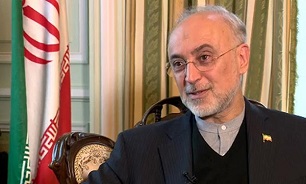Iran Boasts 40% Progress in Completing 2nd Circuit of Arak Heavy Water Reactor
 "If we divide the Arak heavy water reactor into 52 systems, we could say that 20 of them have been completed so far," Salehi broke the news this morning.
"If we divide the Arak heavy water reactor into 52 systems, we could say that 20 of them have been completed so far," Salehi broke the news this morning.
"18 systems are being designed and we have signed contracts for the completion of 12 others," he added.
“Designing and constructing the research reactor of Arak heavy water is one of the salient achievements of the Islamic Republic of Iran taken in the field of nuclear technology," he said.
He expressed hope that the remaining systems of Arak heavy water reaction will be designed and operational by the end of 2020.
Earlier, Salehi had said that his country will operationalize the second phase of the Arak heavy water reactor construction within the next 3 weeks.
“We will make the secondary part of the Arak Heavy Water Reactor Facility operational as early as the next three weeks; the reactor consists of primary and secondary sections whereby an overwhelming part of [nuclear] processes are done in the latter,” Salehi told reporters after attending a parliamentary committee session in Tehran.
Elsewhere in his remarks, Iran's nuclear chief pointed to the latest condition of units 2 and 3 of the Bushehr Nuclear Power Plant, saying, “It’s been two years since [the construction of] Bushehr’s reactors 2 and 3 started, and according to plans, the second reactor will become functional in 2025 and the third in 2027.”
Underscoring technical measures adopted by Tehran to scale back its nuclear commitments under the landmark 2015 nuclear deal, officially known as the Joint Comprehensive Plan of Action (JCPOA), Salehi said, “the reduction of obligations would not constitute a violation of the JCPOA from a technical perspective and the possibility of returning to the pre-JCPOA conditions still exists.”
Before the deal was concluded, the AEOI head said, Iran enriched approximately 2,300 kilograms of enriched uranium [per year] and the current figure stands at 1,700-1,800 kilograms per year. "So we are returning to the conditions that existed before the JCPOA in terms of uranium enrichment capacity," he added.
“In the present situation, all [centrifuges] are modern-generation machines. Therefore, [the pace of] our research studies have not been slowed down or come to a halt,” Salehi added.
"Within the next 2-3 weeks, we will unveil a chain of 30 IR6 [modern centrifuges]," Salehi said.
In October, Spokesman for the Atomic Energy Organization of Iran Behrouz Kamalvandi underlined that Tehran will keep on reducing its commitments under the JCPOA if the European parties do not comply with the JCPOA.
“Iran will continue its remedial steps concerning the commitments to the Joint Comprehensive Plan of Action if the parties to the JCPOA continue with their non-compliance,” Kamalvandi said in a meeting with Finnish Ambassador to Tehran Keijo Norvanto and Head of the EU Delegation to the UN/IAEA in Vienna Stephan Klement.
The AEOI spokesman said that the nuclear regulations, including the Disarmament should be binding for the member-states just like the Charter of the international community, adding that the nuclear rights must be respected for any states away from bias.
Message end/
